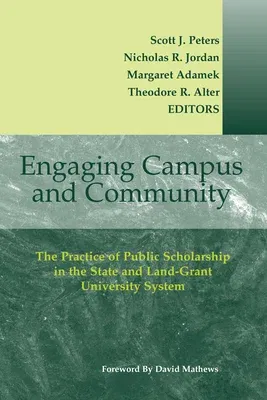Colleges and universities are increasingly being called on to deepen
their engagement in the public work of addressing economic, social, and
environmental challenges. How should they respond? Engaging Campus and
Community examines the practice of public scholarship as a promising
means for academic professionals and students to join with external
partners in addressing our most pressing public problems. Based on four
years of collaborative research by a team of scholars from six different
institutions in the national state and land-grant university system, the
book provides the first in-depth qualitative study of the civic
dimensions of public scholarship in American higher education. The book
presents and analyzes eight case studies of public scholarship involving
close community-university engagement in public work initiatives that
address the economic, social, and environmental challenges of pursuing
agricultural and food systems sustainability. The authors draw lessons
from these cases that have broad relevance for the larger movement to
renew higher education's civic mission and work. Chapters in this volume
include: "Preface," David Mathews "Introduction and Overview," Scott
Peters "Community Food Systems and the Work of Public Scholarship,"
David Campbell and Gail Feenstra "Organizing for Public Scholarship in
Southeast Minnesota," Scott Peters and Karen Lehman "The North Country
Community Food and Economic Security Network: A Profile of David
Pelletier," Margo Hittleman, Scott Peters, and David Pelletier "Bringing
Scholarship to the Orchard: Integrated Pest Management in
Massachusetts," Dan Cooley and Bill Coli "Building a Knowledge Network
for Sustainable Weed Management: An Experiment in Public Scholarship,"
Nicholas Jordan et al. "Teaching as Public Scholarship: Tribal
Perspectives and Democracy in the Classroom," Frank Clancy and Margaret
Adamek "Engaging Campus and Community to Improve Science Education: A
Down-to-Earth Approach," Robert Williamson and Ellen Smoak "An
Exploration of Participatory Methods in a Youth Outreach Program Linked
to University Research," Marianne Krasny "Public Scholarship: An
Administrator's View," Victor Bloomfield "Findings," Scott Peters
"Achieving the Promise of Public Scholarship," Theodore R. Alter.
About the Kettering Foundation
The Kettering Foundation is a nonpartisan, nonprofit operating
foundation rooted in the American tradition of cooperative research.
Kettering's primary research question is: What does it take to make
democracy work as it should? Kettering's research is distinctive because
it is conducted from the perspective of citizens and focuses on what
people can do collectively to address problems affecting their lives,
their communities, and their nation. For more information about
Kettering research and publications, see the Kettering Foundation's
website at www.kettering.org.

